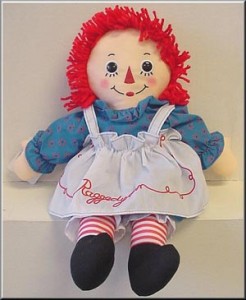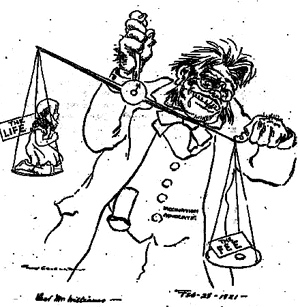
The time is about 1917. Smallpox rears its ugly face and mass inoculation follows on its heels. It is customary, at this time, to inoculate all children in schools against the dreaded disease. Obtaining consent from the parents before inoculating the child is not customary. Children are routinely inoculated, at school, several times for the same disease without parents giving consent or being advised of the inoculations.
Marcella Gruelle is the young daughter of Johnny Gruelle; a successful writer and illustrator employed by a magazine entitled Physical Culture. Marcella has been inoculated at school. She loses her appetite, becomes feverish and fatigued. Her parents do not consent to more inoculations, yet more are given. Marcella’s health continues to decline. She loses her muscle control, becoming listless and lifeless like a rag doll.
Marcella dies a slow and painful death. Seven leading physicians are called upon to opine about the cause of her death. Six consented it is the result of vaccine induced poisoning and call it malpractice. The seventh, being the head of the school board and an supporter of vaccination, declines to comment.
 Soon after his daughter’s death, Johnny is asked to create an illustration to accompany an article, "Vaccines Killed My Two Sisters." The cartoon is a clever and effective work, reflective of Johnny’s style which is familiar to the readers of the magazine. However, they are not prepared for the note which Mr. Gruelle encloses with his single drawing. It reads:
Soon after his daughter’s death, Johnny is asked to create an illustration to accompany an article, "Vaccines Killed My Two Sisters." The cartoon is a clever and effective work, reflective of Johnny’s style which is familiar to the readers of the magazine. However, they are not prepared for the note which Mr. Gruelle encloses with his single drawing. It reads:
"Having recently lost our only daughter through Vaccination (in public school, without our consent) you may realize how terribly HUMOROUS the subject of vaccination appears to Mrs. Gruelle and myself. Of the seven physicians called in on the case, six pronounced it in emphatic terms MALPRACTICE. The seventh did not commit himself, being the head of the school board and a firm advocate of vaccination."
Shortly after Marcella’s death, Johnny creates a doll much different than the more popular, rigid, clay dolls of the time. Rather than create a doll that stands up straight with a healthy and happy glow, in a fitting tribute to his only daughter, he designs a doll to represent her limp and dying body.
In 1920, midwest department store giant, Marshal Field, markets Raggedy Ann. Though most people have no knowledge of the tragic inspiration behind this beloved child’s toy, Raggedy Ann symbolizes a near century of childhood vaccine injuries and deaths.
As we cuddle our sweet dollies at bed time, we do not know that we are preparing ourselves for a time when we may hold our own, lifeless, listless, vaccine-injured child in our arms.
Help yourself to the apple pie.

Maureen from NJ
